
Wage slavery is a term used to criticize perceived exploitation of labor by business, by keeping wages low or stagnant in order to maximize profits. The situation of wage slavery can be loosely defined as a person's dependence on wages for their livelihood, especially when wages are low, treatment and conditions are poor, and there are few chances of upward mobility.

Franklin Rosemont (1943–2009) was an American poet, artist, historian, street speaker, and co-founder of the Chicago Surrealist Group. Over four decades, Franklin produced a body of work, of declarations, manifestos, poetry, collage, hidden histories, and other interventions.
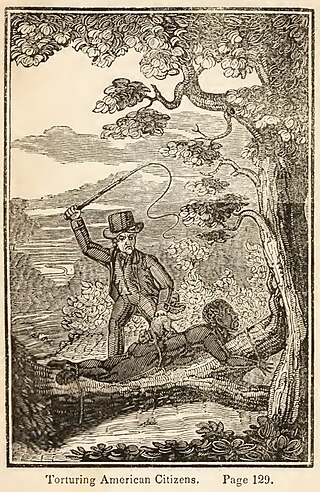
The legal institution of human chattel slavery, comprising the enslavement primarily of Africans and African Americans, was prevalent in the United States of America from its founding in 1776 until 1865, predominantly in the South. Slavery was established throughout European colonization in the Americas. From 1526, during the early colonial period, it was practiced in what became Britain's colonies, including the Thirteen Colonies that formed the United States. Under the law, an enslaved person was treated as property that could be bought, sold, or given away. Slavery lasted in about half of U.S. states until abolition in 1865, and issues concerning slavery seeped into every aspect of national politics, economics, and social custom. In the decades after the end of Reconstruction in 1877, many of slavery's economic and social functions were continued through segregation, sharecropping, and convict leasing.
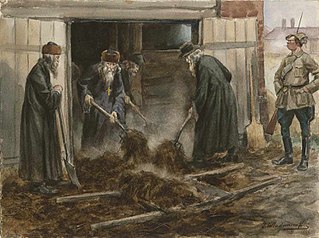
Forced labour, or unfree labour, is any work relation, especially in modern or early modern history, in which people are employed against their will with the threat of destitution, detention, violence including death or other forms of extreme hardship to either themselves or members of their families.
Whiteness studies is the study of the structures that produce white privilege, the examination of what whiteness is when analyzed as a race, a culture, and a source of systemic racism, and the exploration of other social phenomena generated by the societal compositions, perceptions and group behaviors of white people. It is an interdisciplinary arena of inquiry that has developed beginning in the United States from white trash studies and critical race studies, particularly since the late 20th century. It is focused on what proponents describe as the cultural, historical and sociological aspects of people identified as white, and the social construction of "whiteness" as an ideology tied to social status.
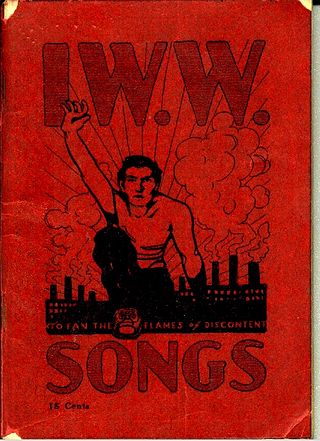
Since the founding of the Industrial Workers of the World (IWW), songs have played a large part in spreading the message of the One Big Union. The songs are preserved in the Little Red Songbook.
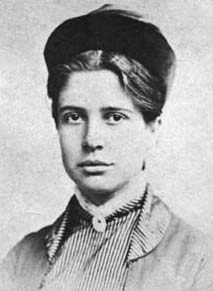
Florence Moltrop Kelley was a social and political reformer and the pioneer of the term wage abolitionism. Her work against sweatshops and for the minimum wage, eight-hour workdays, and children's rights is widely regarded today.

Wage labour, usually referred to as paid work, paid employment, or paid labour, refers to the socioeconomic relationship between a worker and an employer in which the worker sells their labour power under a formal or informal employment contract. These transactions usually occur in a labour market where wages or salaries are market-determined.
White privilege, or white skin privilege, is the societal privilege that benefits white people over non-white people in some societies, particularly if they are otherwise under the same social, political, or economic circumstances. With roots in European colonialism and imperialism, and the Atlantic slave trade, white privilege has developed in circumstances that have broadly sought to protect white racial privileges, various national citizenships, and other rights or special benefits.
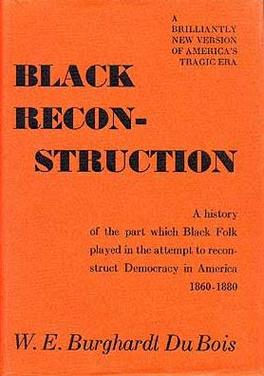
Black Reconstruction in America: An Essay Toward a History of the Part Which Black Folk Played in the Attempt to Reconstruct Democracy in America, 1860–1880 is a history of the Reconstruction era by W. E. B. Du Bois, first published in 1935. The book challenged the standard academic view of Reconstruction at the time, the Dunning School, which contended that the period was a failure and downplayed the contributions of African Americans. Du Bois instead emphasized the agency of Black people and freed slaves during the Civil War and Reconstruction and framed the period as one that held promise for a worker-ruled democracy to replace a slavery-based plantation economy.
George Philip Rawick was an American academic, historian, and socialist, best known for his editorship of a 41-volume set of oral histories of former slaves, titled The American Slave: A Composite Autobiography. Rawick revolutionized the study of slavery in the 1970s with his work, as he viewed the testimony of former slaves to be as serious as documentary left by slaveholders. During his teenage years, he witnessed the systematic extermination of Jewish people by the Nazi regime in World War II. These events initially drew Rawick to Communist politics. His involvement in various leftist groups led him to travel to London, to work with C. L. R. James. In London he met with many prominent Black intellectuals, which caused him to study more about race and slavery.

Joseph Bruce Nelson (1940-2022) was a professor emeritus of history at Dartmouth College and noted labor historian and scholar of the history of the concepts of race and class in the United States and among Western European immigrants to the U.S.

White-Washing Race: The Myth of a Color-Blind Society is a 2005 book arguing that racial discrimination is still evident on contemporary American society. The book draws on the fields of sociology, political science, economics, criminology, and legal studies. The authors argue that the inequalities which prevail in America today, especially with regard to wages, income, and access to housing and health care, are the effects of either cultural or individual failures.
Brian Kelly is an American historian and a lecturer in US history, teaching at Queen's University Belfast in Northern Ireland. His work is concerned mainly with labor and race in the American South, although much of his most recent scholarship focuses on the formative struggles around slave emancipation during the American Civil War and the Reconstruction Era that followed.

Slave breeding was the practice in slave states of the United States of slave owners to systematically force the reproduction of slaves to increase their profits. It included coerced sexual relations between male slaves and women or girls, forced pregnancies of female slaves, and favoring women or young girls who could produce a relatively large number of children. The objective was to increase the number of slaves without incurring the cost of purchase, and to fill labor shortages caused by the abolition of the Atlantic slave trade.
Theodore William Allen was an American independent scholar, writer, and activist, best known for his pioneering writings since the 1960s on white skin privilege and the origin of white identity. His major theoretical work The Invention of the White Race was published in two volumes: Racial Oppression and Social Control (1994) and The Origin of Racial Oppression in Anglo-America (1997). The central ideas of this opus however, appeared in much earlier works such as his seminal Class Struggle and the Origin of Racial Slavery: The Invention of the White Race, published as a pamphlet in 1975, and in expanded form the following year. He claimed that the notion of white race was invented as "a ruling class social control formation."

Herrenvolk democracy is a system of government in which only a specific ethnic group participates in government, while other groups are disenfranchised. Ethnocracy, in which one group dominates the state, is a related concept. The German term Herrenvolk, meaning "master race", was used in 19th century discourse that justified colonialism with the supposed racial superiority of Europeans.
Color consciousness is a theory stating that equality under the law is insufficient to address racial inequalities in society. It rejects the concept of fundamental racial differences, but holds that physical differences such as skin color can and do negatively impact some people's life opportunities. Supreme Court Justice Harry Blackmun in 1978, stated, "In order to get beyond racism, we must first take account of race. There is no other way. And in order to treat some persons equally, we must treat them differently.".
John H. Van Evrie (1814–1896) was an American physician and defender of slavery best known as the editor of the Weekly Day Book and the author of several books on race and slavery which reproduced the ideas of scientific racism for a popular audience. He was also the proprietor of the publishing company Van Evrie, Horton & Company. Van Evrie was described by the historian George M. Fredrickson as "perhaps the first professional racist in American history." His thought, which lacked significant scientific evidence even for the time, emphasized the inferiority of black people to white people, defended slavery as practiced in the United States and attacked abolitionism, while opposing class distinctions among white people and the oppression of the white working class. He repeatedly put "slave" and "slavery" in quotation marks, because he did not think these were the right words for enslaved Blacks.

Settlers: The Mythology of the White Proletariat is a 1983 book by J. Sakai that aims to provide a historical account of the formation of whiteness in the United States.











